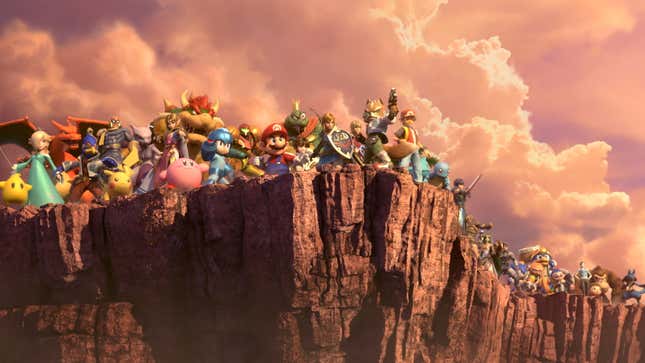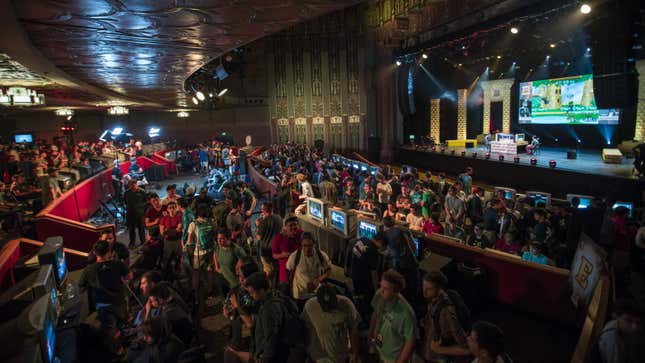
The competitive community for Nintendo’s popular Super Smash Bros. series has recently been rocked by an overwhelming amount of sexual misconduct allegations. An endless stream of victims—many speaking out against highly-skilled, popular, or otherwise powerful individuals—has come forward to expose the dark underbelly of a scene built around playing an ostensible children’s game. This has sparked serious conversation about what can be done to hold people accountable and prevent such widespread abuse in the future.
In the last week, according to Kotaku’s tracking of statements made on social media, more than 50 victims have come forward to expose someone in the Smash community of some sort of sexual misconduct. These accusations include multiple instances of rape, sexual assault, preying on minors, and grooming underage players. Several have resulted in bans from various tournament regions. Esports sponsors are retreating en masse. Without a true governing body to investigate allegations and enforce punishment, however, it’s often left up to the multitude of disparate Smash organizers to decide for themselves what to do on the local level. And as we’ve seen, that’s often a recipe for disaster, especially with how many children attend these events.
“I can’t speak for every other community, but I know in Smash, there was never a voice to speak up and air out the truth,” community artist Jacqueline “Jisu” Choe told Kotaku while discussing her own allegations against retired competitor Gonzalo “ZeRo” Barrios. “While the world at large has finally reached its boiling point and sparked change through movements like #MeToo, the insularity of Smash culture has made it hard for anyone to talk about anything outside of the game. These types of behaviors have been happening for years, and when sporadically brought up, were quickly swept aside because it upset the people. Even worse are people calling it an attempt to ‘clout-chase’ or ‘stir drama’ because the viewer is incapable of seeing how these players they idolize could be horrible people.”
The most recent round of allegations started with Troy “Puppeh” Wells. In the early morning of July 1, the 18-year-old Wells published a Twitlonger focusing on his history with Smash commentator Cinnamon “Cinnpie” Dunson, most notably an alleged sexual relationship in 2016. Wells was just 14 years old at the time while Dunson was 24, and he attributes many unspecified present-day issues to the summer they spent together. Dunson would go on to become a popular choice for commentary at major grassroots tournaments before eventually doing on-air work at an official Nintendo event for Super Smash Bros. Ultimate in 2019.
Dunson has not addressed these allegations publicly, but has been banned from attending events organized by 2GG, a major tournament series based out of Southern California. Wells’ claims against Dunson seemed to open the floodgates for a torrent of similar accusations in the Smash community, many of which also involve minors. Dunson did not reply to multiple requests for comment.
Starting on July 2, a litany of allegations were also published about Jason “ANTi” Bates, who some consider one of the best players of the Super Smash Bros. for Wii U era. An anonymous person, speaking through a third party on Twitter who has since closed down their account, said a group of players that included Bates had slept with her when she was just 15 years old. She claimed that Bates, who would have been 21 or 22 at the time, advised her when they met in 2016 to tell everyone she was on the verge of turning 18 to avoid arousing suspicion.
Bates denied the allegations, claiming the anonymous victim had told him she was 18 and that the women of the Smash community had a “beef” with him. He’s since deleted the statement, locked down his Twitter account, distanced himself from Smash, and promised to get lawyers involved. Bates did not reply to multiple requests for comment. After several more women came forward about encounters with Bates, his sponsor, the South Korean esports organization T1, terminated their contract.
Gonzalo “ZeRo” Barrios was perhaps the largest figure in the Smash community to be cited for alleged sexual misconduct. Barrios, who stepped away from competition in early 2018 in favor of streaming, is one of the top Smash players of all time thanks to a 56-tournaments win streak in Super Smash Bros. for Wii U. But now, his legacy also includes allegations of sexual harassment, both of which involved minors.
Jacqueline “Jisu” Choe, a popular artist in the Smash community, first came forward on July 2 to say that, while they were living in the same house, Barrios had frequently shown her explicit content like Craigslist ads for sex workers and hentai when she was 15 years old. The next day, an alleged victim using the pseudonym Katie said that she and Barrios had had a sexual relationship over the internet when she was 14 and Barrios was 19. Barrios initially denied these allegations, saying he hadn’t ever purposely exposed Choe to explicit material and wasn’t aware that Katie was underage, before eventually addressing his behavior and promising to step away from the Smash community in the face of overwhelming evidence collected by Choe concerning his history with the two women.
“After really looking into Jisu’s claims, I started to understand and feel that in the end Jisu feels very wronged and affected and ultimately she wants an apology directly from me,” Barrios wrote on July 3. The next day, Barrios also addressed Katie’s allegations, writing, “It’s true. The claims that Katie makes are true in general.” Barrios did not reply to multiple requests for comment.
Facebook Gaming, with which Barrios had signed an exclusive streaming deal in December 2019, and esports organization Tempo Storm publicly cut ties with him the same day.

“While a lot of the same issues are spread throughout gaming at large, the Smash community is so unique because it takes those same themes but amplifies it through its unregulated gateways, which naturally leads to the worst potential outcomes,” Choe explained to Kotaku. “The community is so down-to-earth, grassroots, and inviting, but it’s also undocumented, unsponsored, and unregulated. For a lot of good people, there is no issue, but for potential criminals and those prone to abusing such gateways, it is an opportunity to prey on minors and other unprotected community members. Adults and children are corralled into the same spaces, the same hotel rooms, and largely the same mature party culture despite the game appealing mostly to younger children.
“Lack of regulation also means that social structures and regulation then comes from an emergent ‘homie’ culture, where ‘bro code’ and social stigmas overrule any real logic,” Choe said. “Social hierarchies, particularly male-dominated, grow to dominate the scene, and thus serious things are then regulated through the unspoken rules of friendship. Serious issues that should be discussed and investigated in a business or legal setting do not get the thorough, objective analysis that they need, and instead, get swept under the rug or unaccounted for. This leads to corruption, and a lack of consequences and/or accountability.”
Despite being mostly hands-off when it comes to competition, Super Smash Bros. developer Nintendo addressed this glut of allegations in a recent statement to BBC. “We are deeply disturbed by the allegations raised against certain members of the competitive gaming community,” the Japanese company said. “They are absolutely impermissible. We want to make it clear that we condemn all acts of violence, harassment, and exploitation against anyone and that we stand with the victims.”
What exactly Super Smash Bros. community leaders can do is up in the air. Responding to these incidents as they happen is well and good, but how can they be prevented altogether? Recent events have shown that there are deep, systemic issues in the Smash community, all of which can be found in the traditional fighting game community or esports or the music and film industries or really anywhere that people come together and interact. In many of these allegations, there were other people present who could have said something if a culture of silence hadn’t already been established. If competitors truly want to live up to the word “community,” they’ll need to figure out a way to be more proactive than reactive when it comes to abuse in their midst.